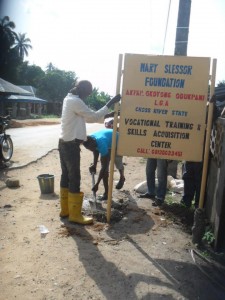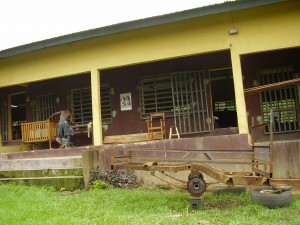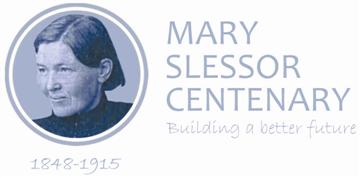The Mary Slessor Foundation was founded in 2002 by Dr Lawrie Mitchell MBE and his wife Mrs  Eme Mitchell, great great granddaughter of Ma Eme. Their hope was to continue the work of Mary Slessor, the renowned Scottish missionary and set up the Mary Slessor Foundation in her name.
Eme Mitchell, great great granddaughter of Ma Eme. Their hope was to continue the work of Mary Slessor, the renowned Scottish missionary and set up the Mary Slessor Foundation in her name.
The project is located in Akpap Okoyong, 55km north of Calabar, Cross River State, Nigeria. This was where Mary Slessor devoted her life before dying at the age of 67 in 1915. Land for the Foundation’s work in Nigeria was leased from Eme’s brother rent free for the first five years of its work.
The Foundation aims to emulate the work of Mary Slessor and raise awareness of her story and achievements. It works in Southern Nigeria on community based social, economic and health care projects.
The Skills Training Centre works with young people to teach them vocational skills including mechanical engineering, welding, carpentry, fashion and design, and other trades which will enable them to gain employment and support their families and communities. Those attending the centre work towards achieving life skills to build confidence and share knowledge.
An Agricultural Processing Unit specialises in producing garri, which is a staple food of West Africa and also manufacturing palm oil. Both products are sold to generate revenue to further the Foundation’s work in the community.
When funds permit a clinic is run to offer advice and healthcare support to the local community. The Foundation aims to gradually become self-supporting and no longer have to rely on charitable donations in the future.
The Mary Slessor Foundation is registered with the Scottish Charities Commission in Edinburgh and the Corporate Affairs Commission in Abuja, Nigeria. In addition we have a longstanding partnership with Voluntary Service Overseas.
Dr Mitchell was awarded the MBE for his charitable work with the Foundation.
Thanks to the Mary Slessor Foundation, the people of this disadvantaged rural area where Mary lived and worked, no longer have to trek 5km water for their water, and can process their crops instead of simply selling the raw produce.
